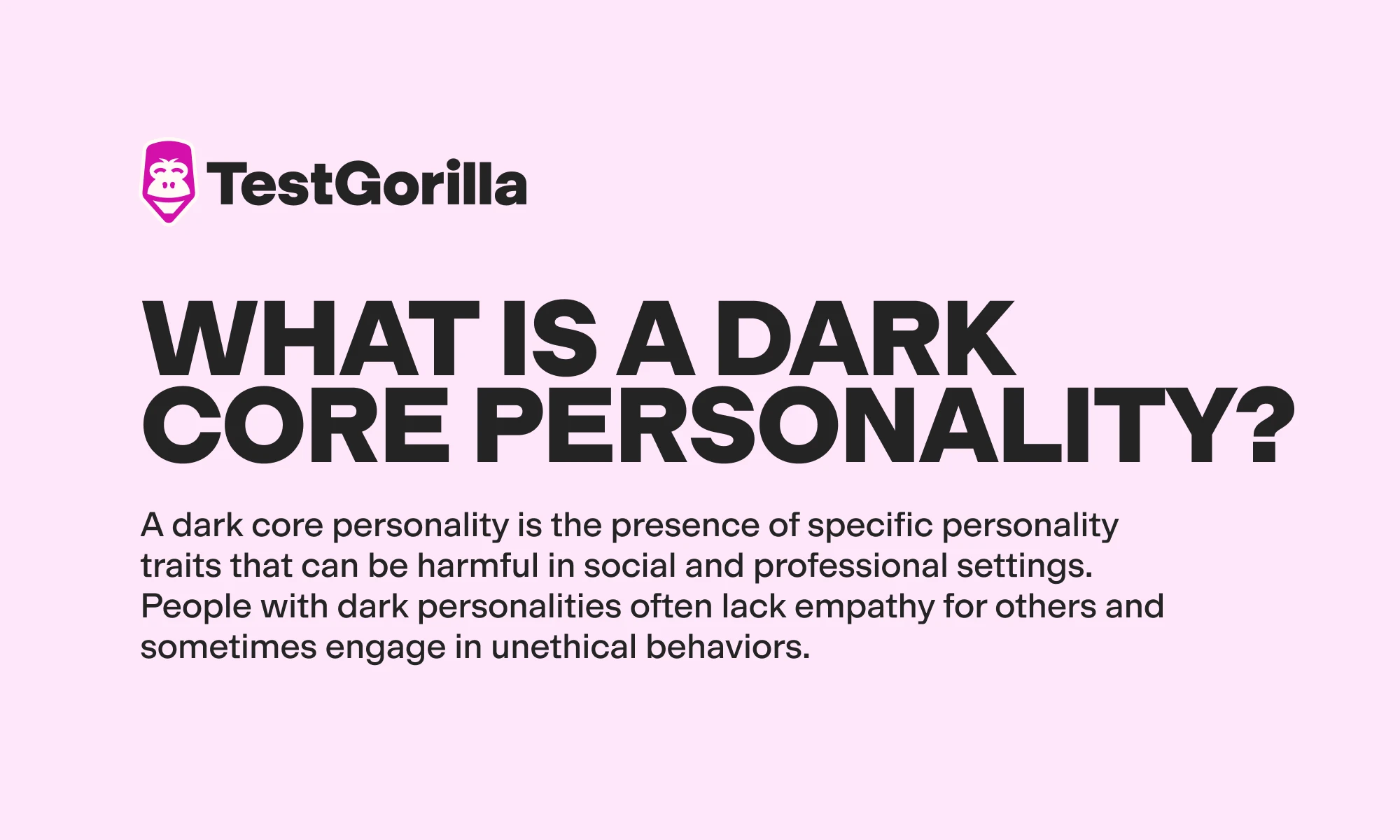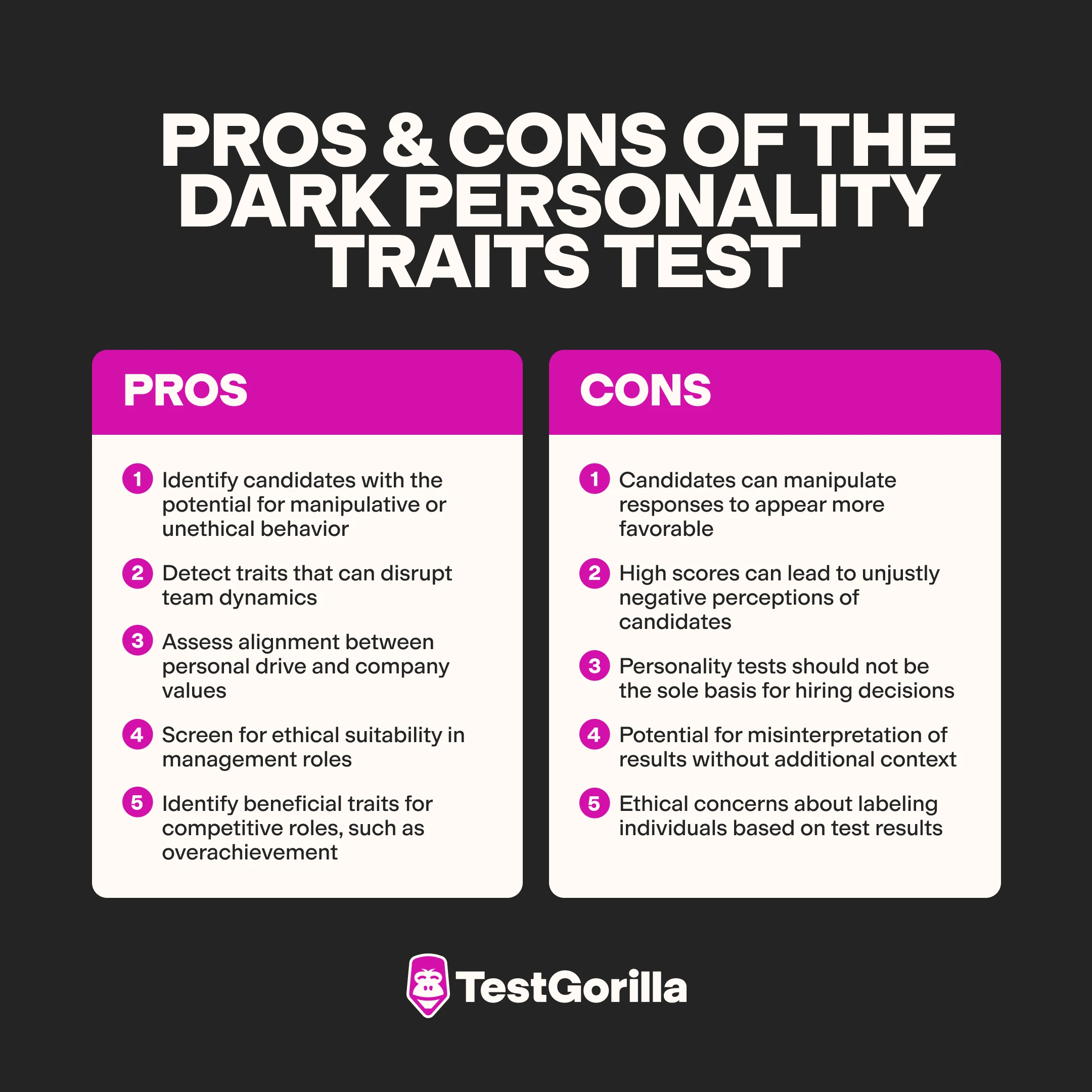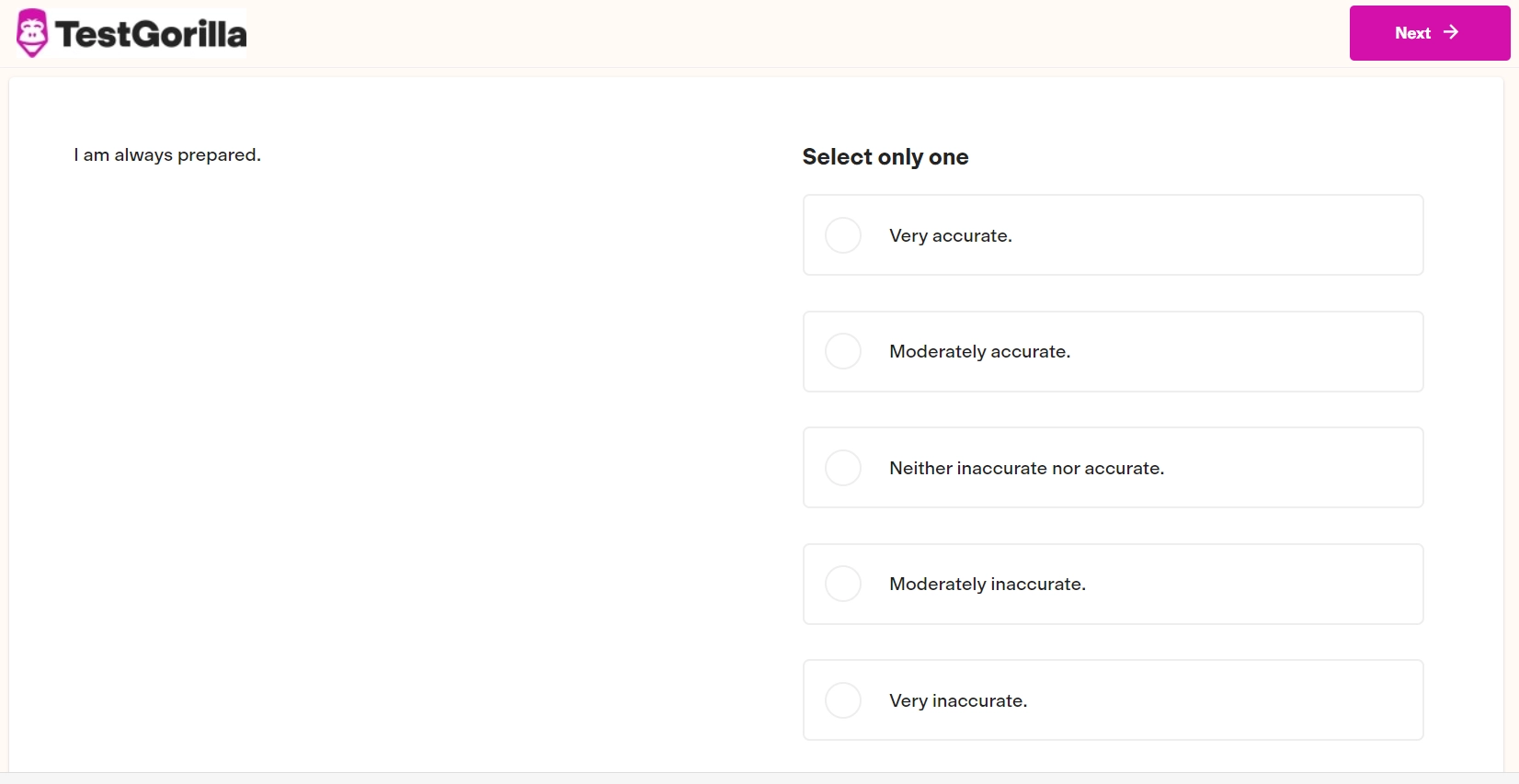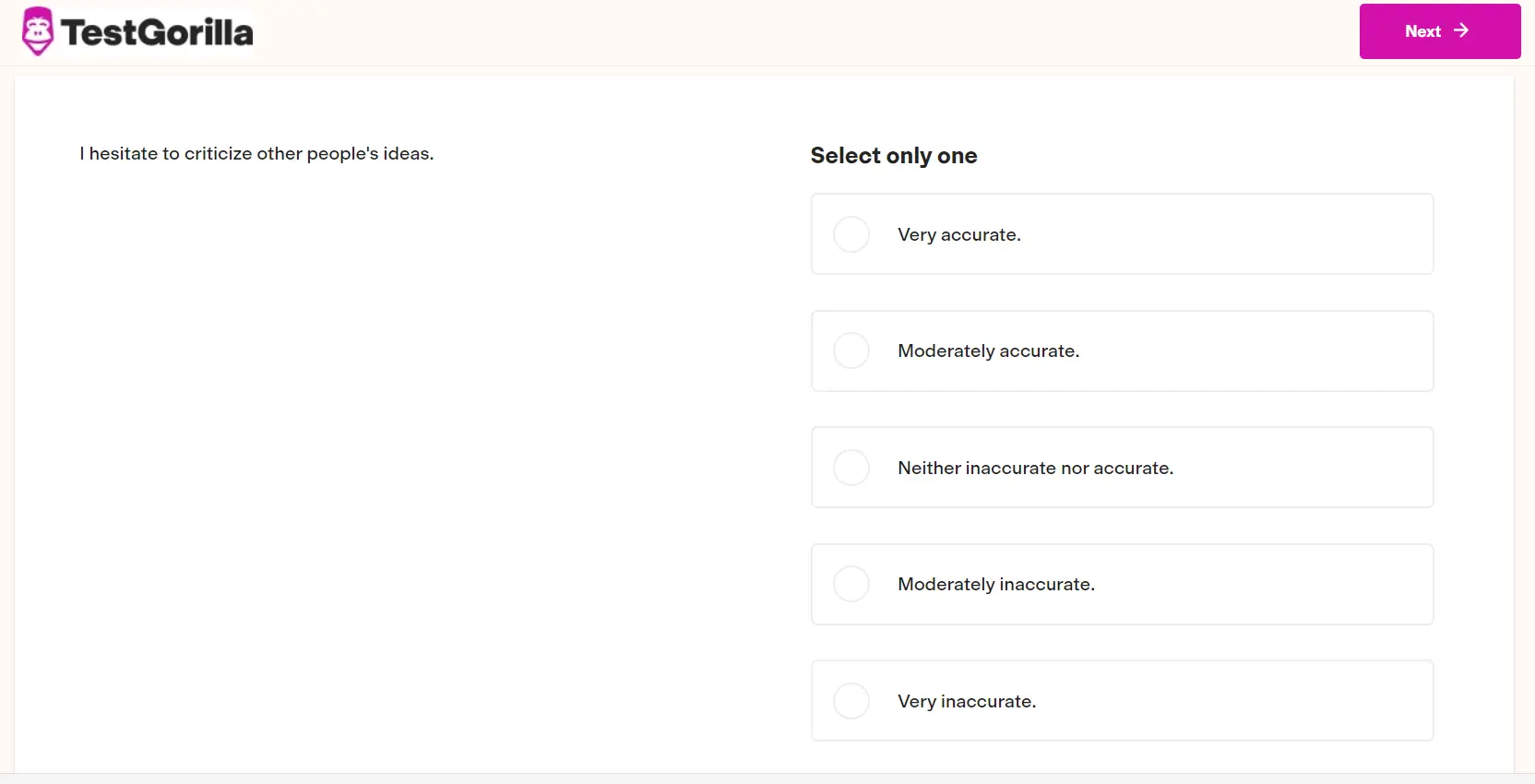The dark core personality test: An employer’s guide to getting to know your candidates better
Choose the best personality test to learn more about your candidates’ traits
Hiring someone with hidden dark traits can lead to challenges in the workplace, such as manipulative behavior, poor teamwork, and ethical breaches. These issues create a toxic work environment and damage a company’s reputation.
A dark core personality test helps you identify these traits to avoid potential hiring mistakes that could harm your team and company culture.
In this article, we explore what the dark personality traits test is, how you can use it in recruitment, and why it’s important to consider other personality assessments for a well-rounded view of your candidates.
Table of contents
- What is the dark core personality test?
- The dark core personality tests
- Is a dark personality test useful in recruiting? The pros and cons
- The better alternative for recruiting: Personality and culture tests
- 5 personality and culture tests to use in your assessments
- Use personality tests to make better hiring decisions
What is the dark core personality test?
The dark core personality test determines how prone someone is to having dark personality traits and displaying morally and ethically questionable behavior in their everyday life. These traits could, for instance, drive individuals to engage in activities that further their interests over those of others while trying to justify their actions to avoid repercussions.
Recent research suggests that people are more prone to malevolence than we think. That’s why you should pay attention to the General Dark Factor of Personality, or the D-factor, which corresponds to indifference and maliciousness.
Knowing if someone scores high or low on a D-factor personality test can be useful for recruitment because it explains tendencies toward selfishness, manipulation, or lack of empathy.
What is a dark core personality?
A dark core personality is the presence of specific personality traits that can be harmful in social and professional settings. People with dark personalities often lack empathy for others and sometimes engage in unethical behaviors.
The three main traits associated with the dark core of personality are:
Narcissism: An inflated sense of self-importance and a deep need for admiration. Individuals with high levels of narcissism usually prioritize their own needs and desires over those of others, often at the expense of teamwork and collaboration.
Psychopathy: A personality characterized by impulsivity, antisocial behavior, and a lack of empathy. Psychopaths exhibit callousness and manipulative and deceitful behavior, which are particularly disruptive in a workplace setting.
Machiavellianism: A tendency to manipulate and deceive others to achieve personal goals. Those with high Machiavellian traits are often strategic and calculated, willing to exploit others for their gain without regard for the consequences.
Interestingly, leaders with this common core of dark triad traits (narcissism, psychopathy, and Machiavellianism) positively impact some aspects of their company’s performance, such as sales.
However, this comes at a cost because these traits often lead to toxic behaviors like manipulation, lack of empathy, and arrogance. These issues create distrust among top management and harm internal collaboration and morale.
The dark core personality tests
Dark core tests provide valuable insights into how an individual acts when faced with ethical dilemmas or power dynamics in the workplace. Two of the most well-known assessments in this area are the D-factor and Dark Triad personality tests.
Let’s see how they compare.
The D-factor personality test
This dark core test is based on the work of Morten Moshagen and Ingo Zettler and evaluates individuals’ general dispositions toward dark traits, represented by the D-factor. The D-factor test helps you identify the following characteristics:
Egoism
Machiavellianism
Moral disengagement
Narcissism
Psychological entitlement
Psychopathy
Sadism
Socially aversive traits
Self-interest
Spitefulness
A person can score high in one or more of these traits, such as egoism and narcissism, but not display other dark-trait tendencies.
D-factor personality tests use questions like:
Do you often feel that you deserve special treatment over others?
Is it acceptable to bend the rules or make justifications if it means achieving your goals?
Would you enjoy seeing someone you dislike experience misfortune?
Would you take credit for someone else’s work if it meant advancing your career?
Each question is rated on a scale of one to five, where one indicates strong disagreement and five indicates strong agreement. To calculate the D-factor score, you must:
Assign a numerical value to each response based on a predetermined scale
Add up the scores for all the questions across the different dark traits
Divide the total sum by the number of questions to get the overall D-factor score
For example, if a candidate answers 10 questions with scores that total 40, the D-factor score would be four (40 divided by 10).
A D-factor score above 3.5 is high, indicating a person could prioritize their own gain at the expense of others, regardless of the means. Conversely, a lower score indicates a lesser inclination towards these traits.
Note: This is the simplest way to calculate the D-factor score. Some online calculators use a different scale, so don’t be surprised if you get different values or percentages.
TestGorilla: An easy way to assess your candidates’ personality traits
Using our personality and culture tests is the easiest way to assess personality traits and determine if your candidates are good for the role. Sign up for free and start using our Big 5 (OCEAN) test to evaluate your applicants’ five dimensions of personality.
The Dark Triad personality test
The Dark Triad personality test, popularized by Paulhus and Williams, two psychologists, is simpler than the D-factor because it measures candidates on three general malevolent traits:
Machiavellianism is associated with manipulation and the absence of moral virtues
Narcissism is related to pride, selfishness, and a lack of empathy
Psychopathy is associated with antisocial behavior and indifference toward others
All three traits are distinct but overlapping and are a good indicator of a candidate’s view and approach to life in general.
The Dark Triad personality tests include questions and statements like:
You should avoid direct conflict with others because they can be useful in the future.
Do you find it easy to manipulate others to achieve your goals?
Would you lie or cheat if it helped you get what you want?
Do you often think about how special you are compared to others?
Each question is rated on a scale from one to five, where one indicates strong disagreement and five indicates strong agreement. You calculate the scores the same way as with the D-factor test.
The scores for Machiavellianism, narcissism, and psychopathy are often interpreted individually, focusing on how these specific traits influence a candidate’s behavior.
However, some studies have suggested that these tests are not as great at differentiating between these three traits as some newer measures, like the Five-Factor Model.
The best insights on HR and recruitment, delivered to your inbox.
Biweekly updates. No spam. Unsubscribe any time.
Is a dark personality test useful in recruiting? The pros and cons
Dark personality tests provide valuable insights into an applicant’s potential for disruptive behavior, but you should use them cautiously. Although candidates who score low on the dark core personality tests are more desirable for recruiters, those who score high aren’t necessarily a bad choice.
For example, someone with a high score on the self-interest trait is more likely to go above and beyond to achieve their goals. It makes them an overachiever, which should be regarded as a positive trait for an employee.
However, if they disregard the wellbeing of others to achieve their goals, the trait could become negative.
One limitation of dark factor tests is that candidates can often predict the “right” answers.
For example, when asked, “Would you lie or cheat if it helped you get what you want?” most people would strongly disagree, even if their actual behavior differs in real life. They choose a socially acceptable answer rather than revealing their general tendency.
Overrelying on your dark core personality tests can make you overlook candidates who have potential but also a few traits that, without context, appear negative to the average person.
To mitigate this, you can embrace skills-based hiring by combining dark person tests with other questionnaires, such as personality, culture, and role-specific skills tests. This approach provides a more comprehensive conceptualization of the candidate, helping you look beyond the surface-level responses to make a more informed hiring decision.
Here’s a quick pros and cons list of dark personality traits test:
Pros | Cons |
- Identify candidates with the potential for manipulative or unethical behavior
- Detect traits that can disrupt team dynamics
- Assess alignment between personal drive and company values
- Screen for ethical suitability in management roles
- Identify beneficial traits for competitive roles, such as overachievement | - Candidates can manipulate responses to appear more favorable
- High scores can lead to unjustly negative perceptions of candidates
- Personality tests should not be the sole basis for hiring decisions
- Potential for misinterpretation of results without additional context
- Ethical concerns about labeling individuals based on test results |
The better alternative for recruiting: Personality and culture tests
Although dark core personality tests offer insights into potential risks, personality and culture tests help you understand the broader nuances of a person’s character, how they approach work, and how they interact with others.
Personality tests, such as the Big 5 (OCEAN) or the 16 Personality Types (more on them later), assess various traits relevant to job performance and teamwork. For example, a candidate who scores high in conscientiousness is likely to be diligent and reliable, making them a strong fit for roles requiring attention to detail and persistence.
One of the key advantages of personality and culture tests is their versatility.
You can combine them with role-specific and soft skills tests into a talent assessment to better evaluate how a candidate can perform in the role.
For example, pairing a personality assessment with a Problem Solving test lets you see how a candidate thinks and approaches challenges in the workplace.
You can use TestGorilla’s guide to interpreting personality tests to help you select the right assessment. Generally, we don’t recommend making a hiring decision solely based on personality tests because it can skew your interpretation of what a candidate offers.
Instead, you want to integrate personality and pre-employment screening tests for a more rounded understanding of your candidates’ skills and traits. It gives you a comprehensive picture of how well they match your hiring criteria.
Transform your hiring process with TestGorilla
Forget about hiring the wrong people. Join 90% of employers who experience fewer mis-hires by using talent assessments with personality tests to screen their candidates.
5 personality and culture tests to use in your assessments
Personality tests help you understand the nuances of your candidates’ behavior, motivations, and potential.
For example, Solid Solutions turned to TestGorilla to assess technical skills in engineering candidates. However, hiring managers quickly realized the value of our soft skills and personality tests, leading them to integrate these assessments into their recruitment process.
The impact was significant – the company hired better engineering talent and improved new hire retention. This success was evident among placement students because 95% received full-time roles after graduation.
Let’s review the five best personality tests to improve your recruitment process.
1. Big 5 (Ocean) test
The Big 5 (OCEAN) test evaluates candidates across five major dimensions of personality:
Openness
Conscientiousness
Extraversion
Agreeableness
Neuroticism
These traits are crucial for predicting a candidate’s behavior in a professional environment, from how they approach problem-solving to how they interact with colleagues. The test includes questions like the one below:
The great thing about our Big Five test is that it’s completely free. All you have to do is sign up for the Free forever plan and start using it immediately.
2. Enneagram test
The Enneagram test uncovers the core motivations and fears that drive a candidate’s behavior. It categorizes individuals into nine distinct personality types, providing insights into how they approach challenges, work in teams, and handle stress.
This test is valuable for roles that require strong emotional intelligence and adaptability, such as customer service managers and project leaders.
3. DISC Personality test
The DISC Personality test is a powerful tool for discovering how candidates behave and communicate in the workplace. It assesses individuals across four main behavior types:
Dominance
Influence
Steadiness
Conscientiousness
Understanding where a candidate falls within these categories lets you predict how they interact with others, how they approach tasks, and their overall work style.
This DISC Personality test is great for roles that require effective communication and teamwork, such as sales or management positions. Here’s an example question from this test:
4. 16 Personality Types test
The 16 Personality Types test is based on the Myers-Briggs Type Indicator, a well-researched personality assessment. It classifies individuals into one of 16 types, each with strengths, weaknesses, and preferred ways of working.
This test is useful for understanding how a candidate approaches problem-solving, decision-making, and teamwork.
5. Culture Add test
The Culture Add test assesses how well a candidate’s values and behaviors match your company’s culture. Unlike traditional “culture fit” assessments, this test focuses on what a candidate brings to the table that is new and beneficial to create a more diverse and inclusive work environment.
Including this test in your hiring process is a great way to support diversity in the workplace. It can contribute to innovation, which is one of the driving forces of growth, according to 84% of executives.
Use personality tests to make better hiring decisions
Dark core personality tests help hiring managers identify candidates with potentially disruptive traits. Although these tests reveal risks, without the right context, they don’t offer comprehensive data to improve your hiring decisions.
Personality and culture tests provide more information about a candidate’s strengths, values, and how they approach work.
Use them with role-specific skills assessments to better understand how your candidate can fit into your team and contribute to your company’s success.
Sign up for a Free forever plan to use the Big 5 (OCEAN) test today.
You can also take a product tour to learn about talent assessments and how to customize them to fit your recruiting needs.
Or book a live demo and let one of our skill-based assessment experts explain the full benefits of using our platform.
You've scrolled this far
Why not try TestGorilla for free, and see what happens when you put skills first.

























